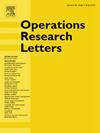带有后台信息处理功能的旅行推销员问题
IF 0.8
4区 管理学
Q4 OPERATIONS RESEARCH & MANAGEMENT SCIENCE
引用次数: 0
摘要
本文介绍了带有后端信息处理(bTSP)的旅行推销员问题(TSP),该问题将后端处理时间整合到路径规划中,以最小化时间跨度。研究开发了一种混合整数线性规划公式,并进行了理论分析,以了解 TSP 与 bTSP 之间的关系。结果表明,通过利用与标准 TSP 的联系,可以高效地得出 bTSP 的最优解。本文章由计算机程序翻译,如有差异,请以英文原文为准。
Traveling salesman problem with backend information processing
This paper introduces the Traveling Salesman Problem (TSP) with Backend Information Processing (bTSP), which integrates backend processing times into path planning to minimize the makespan. The study develops a mixed integer linear programming formulation and conducts a theoretical analysis to understand the relationship between the TSP and the bTSP. The results show that an optimal solution for the bTSP can be efficiently derived by leveraging the connection to the standard TSP.
求助全文
通过发布文献求助,成功后即可免费获取论文全文。
去求助
来源期刊

Operations Research Letters
管理科学-运筹学与管理科学
CiteScore
2.10
自引率
9.10%
发文量
111
审稿时长
83 days
期刊介绍:
Operations Research Letters is committed to the rapid review and fast publication of short articles on all aspects of operations research and analytics. Apart from a limitation to eight journal pages, quality, originality, relevance and clarity are the only criteria for selecting the papers to be published. ORL covers the broad field of optimization, stochastic models and game theory. Specific areas of interest include networks, routing, location, queueing, scheduling, inventory, reliability, and financial engineering. We wish to explore interfaces with other fields such as life sciences and health care, artificial intelligence and machine learning, energy distribution, and computational social sciences and humanities. Our traditional strength is in methodology, including theory, modelling, algorithms and computational studies. We also welcome novel applications and concise literature reviews.
 求助内容:
求助内容: 应助结果提醒方式:
应助结果提醒方式:


